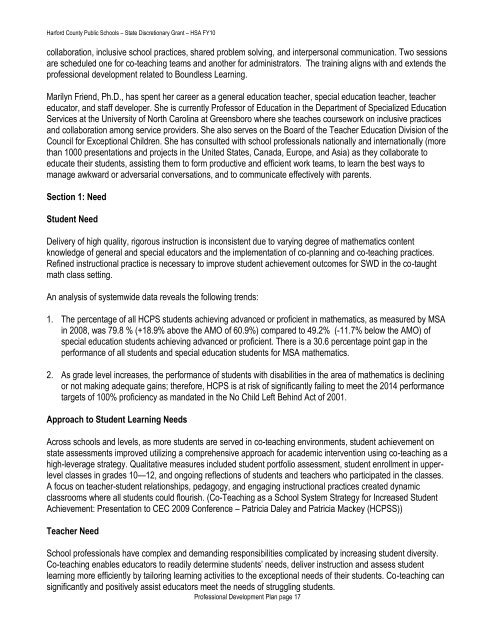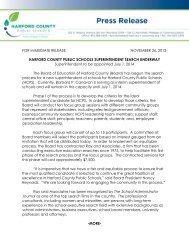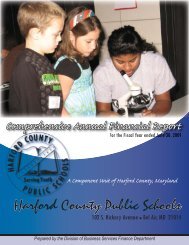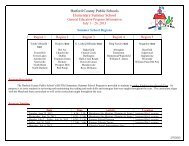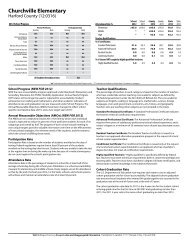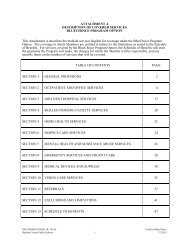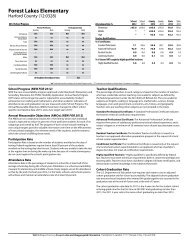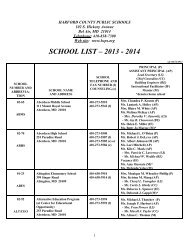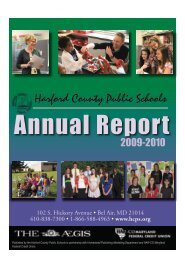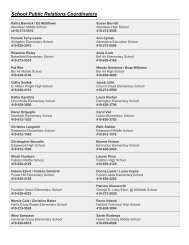Successmaker Enterprise Software Purchase - Harford County ...
Successmaker Enterprise Software Purchase - Harford County ...
Successmaker Enterprise Software Purchase - Harford County ...
Create successful ePaper yourself
Turn your PDF publications into a flip-book with our unique Google optimized e-Paper software.
<strong>Harford</strong> <strong>County</strong> Public Schools – State Discretionary Grant – HSA FY10<br />
collaboration, inclusive school practices, shared problem solving, and interpersonal communication. Two sessions<br />
are scheduled one for co-teaching teams and another for administrators. The training aligns with and extends the<br />
professional development related to Boundless Learning.<br />
Marilyn Friend, Ph.D., has spent her career as a general education teacher, special education teacher, teacher<br />
educator, and staff developer. She is currently Professor of Education in the Department of Specialized Education<br />
Services at the University of North Carolina at Greensboro where she teaches coursework on inclusive practices<br />
and collaboration among service providers. She also serves on the Board of the Teacher Education Division of the<br />
Council for Exceptional Children. She has consulted with school professionals nationally and internationally (more<br />
than 1000 presentations and projects in the United States, Canada, Europe, and Asia) as they collaborate to<br />
educate their students, assisting them to form productive and efficient work teams, to learn the best ways to<br />
manage awkward or adversarial conversations, and to communicate effectively with parents.<br />
Section 1: Need<br />
Student Need<br />
Delivery of high quality, rigorous instruction is inconsistent due to varying degree of mathematics content<br />
knowledge of general and special educators and the implementation of co-planning and co-teaching practices.<br />
Refined instructional practice is necessary to improve student achievement outcomes for SWD in the co-taught<br />
math class setting.<br />
An analysis of systemwide data reveals the following trends:<br />
1. The percentage of all HCPS students achieving advanced or proficient in mathematics, as measured by MSA<br />
in 2008, was 79.8 % (+18.9% above the AMO of 60.9%) compared to 49.2% (-11.7% below the AMO) of<br />
special education students achieving advanced or proficient. There is a 30.6 percentage point gap in the<br />
performance of all students and special education students for MSA mathematics.<br />
2. As grade level increases, the performance of students with disabilities in the area of mathematics is declining<br />
or not making adequate gains; therefore, HCPS is at risk of significantly failing to meet the 2014 performance<br />
targets of 100% proficiency as mandated in the No Child Left Behind Act of 2001.<br />
Approach to Student Learning Needs<br />
Across schools and levels, as more students are served in co-teaching environments, student achievement on<br />
state assessments improved utilizing a comprehensive approach for academic intervention using co-teaching as a<br />
high-leverage strategy. Qualitative measures included student portfolio assessment, student enrollment in upperlevel<br />
classes in grades 10—12, and ongoing reflections of students and teachers who participated in the classes.<br />
A focus on teacher-student relationships, pedagogy, and engaging instructional practices created dynamic<br />
classrooms where all students could flourish. (Co-Teaching as a School System Strategy for Increased Student<br />
Achievement: Presentation to CEC 2009 Conference – Patricia Daley and Patricia Mackey (HCPSS))<br />
Teacher Need<br />
School professionals have complex and demanding responsibilities complicated by increasing student diversity.<br />
Co-teaching enables educators to readily determine students’ needs, deliver instruction and assess student<br />
learning more efficiently by tailoring learning activities to the exceptional needs of their students. Co-teaching can<br />
significantly and positively assist educators meet the needs of struggling students.<br />
Professional Development Plan page 17


